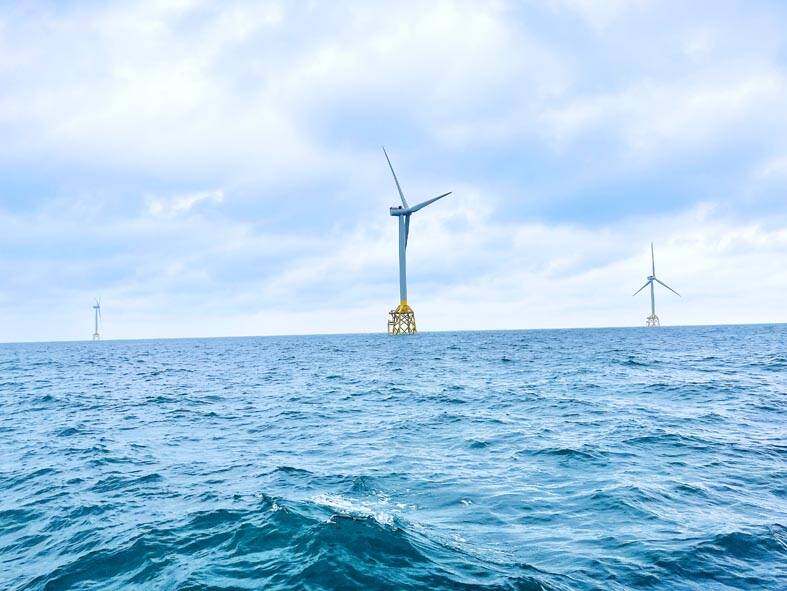People working in industries that would be most negatively impacted by the government’s net zero carbon emissions policy have an insufficient understanding of what the target is and what its effects are likely to be, a survey published on Wednesday showed.
The Survey on Awareness of Just Transition of High-carbon Industries in Taiwan, published for the second year by National Taiwan University’s Risk Society and Policy Research Center, found that 49.8 percent of respondents said they had little understanding of the government’s net zero policies.
Although that figure is still high, it marks a substantial decrease from last year’s 81.2 percent, center director Chou Kuei-tien (周桂田) told a news conference in Taipei to introduce the report’s findings.

Photo: Liao Chia-ning, Taipei Times
The center surveyed 521 employees, managers and executives working in carbon-intensive industries from October to last month.
The survey showed that 46.8 percent of respondents were worried about the burden of decarbonization on them personally, for example, increased costs being passed on, Chou said, adding that the figure was down from 57.7 percent in last year’s survey.
Young and female employees were the most concerned, he said.
The government should enhance community participation to deepen a “just transition consciousness” and build a strong social foundation for when net zero transition policies are implemented, he said.
Most respondents said that funds collected through carbon fees — scheduled to be collected from 2025 — should be used to boost employment by helping small and medium-sized enterprises (SMEs) and workers acquire skills needed for success in low-carbon industries, the survey showed.
It showed that 89.9 percent agreed SMEs should be consulted before net zero policies are implemented, while 77.5 percent said the government, companies and employees should have three-way meetings to develop ways to help manage the fallout from the policies.
Chou said that carbon fees should be made a “carbon tax,” as the former is more restrictive.
Article 33 of the Climate Change Response Act (氣候變遷因應法) says that the fees could be used to “assist the central competent agency to execute a just transition” among a list of 13 purposes.
“A carbon tax, administered by the Ministry of Finance, could potentially have a much wider scope of use, as it would be collected by the central government,” Chou said.
David Walther (王瑞庚), program manager at Academia Sinica’s Center for Sustainability Science, said that communication and assistance need to be in place early and be available to all who would be affected to avoid large protests.
Walther also highlighted the importance of an Executive Yuan-led oversight mechanism, instead of each ministry having to cope with net zero issues alone, “such as the Ministry of Agriculture regarding solar power and the Ministry of the Interior regarding national land.”
Following this logic, the Ministry of Labor and the Ministry of Welfare and Health are yet to be affected by net zero issues and so have not made any moves, he said.
A Cabinet-level directive needs to be issued to coordinate a comprehensive roadmap encompassing every ministry, especially the Ministry of Digital Affairs, which needs to develop “digital sustainability,” he added.
Youth Labor Union 95 director Ray Cheng (鄭中睿) said that the Ministry of Education needs to take a more active role in helping the public prepare for a green transition.
There is a complete lack of human resource planning in the net zero roadmap that the National Development Council released last year, Cheng said.

Beijing could eventually see a full amphibious invasion of Taiwan as the only "prudent" way to bring about unification, the US Department of Defense said in a newly released annual report to Congress. The Pentagon's "Annual Report to Congress: Military and Security Developments Involving the People's Republic of China 2025," was in many ways similar to last year’s report but reorganized the analysis of the options China has to take over Taiwan. Generally, according to the report, Chinese leaders view the People's Liberation Army's (PLA) capabilities for a Taiwan campaign as improving, but they remain uncertain about its readiness to successfully seize

Taiwan is getting a day off on Christmas for the first time in 25 years. The change comes after opposition parties passed a law earlier this year to add or restore five public holidays, including Constitution Day, which falls on today, Dec. 25. The day marks the 1947 adoption of the constitution of the Republic of China, as the government in Taipei is formally known. Back then the Chinese Nationalist Party (KMT) governed China from Nanjing. When the KMT, now an opposition party in Taiwan, passed the legislation on holidays, it said that they would help “commemorate the history of national development.” That

Taiwan has overtaken South Korea this year in per capita income for the first time in 23 years, IMF data showed. Per capita income is a nation’s GDP divided by the total population, used to compare average wealth levels across countries. Taiwan also beat Japan this year on per capita income, after surpassing it for the first time last year, US magazine Newsweek reported yesterday. Across Asia, Taiwan ranked fourth for per capita income at US$37,827 this year due to sustained economic growth, the report said. In the top three spots were Singapore, Macau and Hong Kong, it said. South

Snow fell on Yushan (Jade Mountain, 玉山) yesterday morning as a continental cold air mass sent temperatures below freezing on Taiwan’s tallest peak, the Central Weather Administration (CWA) said. Snowflakes were seen on Yushan’s north peak from 6:28am to 6:38am, but they did not fully cover the ground and no accumulation was recorded, the CWA said. As of 7:42am, the lowest temperature recorded across Taiwan was minus-5.5°C at Yushan’s Fengkou observatory and minus-4.7°C at the Yushan observatory, CWA data showed. On Hehuanshan (合歡山) in Nantou County, a low of 1.3°C was recorded at 6:39pm, when ice pellets fell at Songsyue Lodge (松雪樓), a